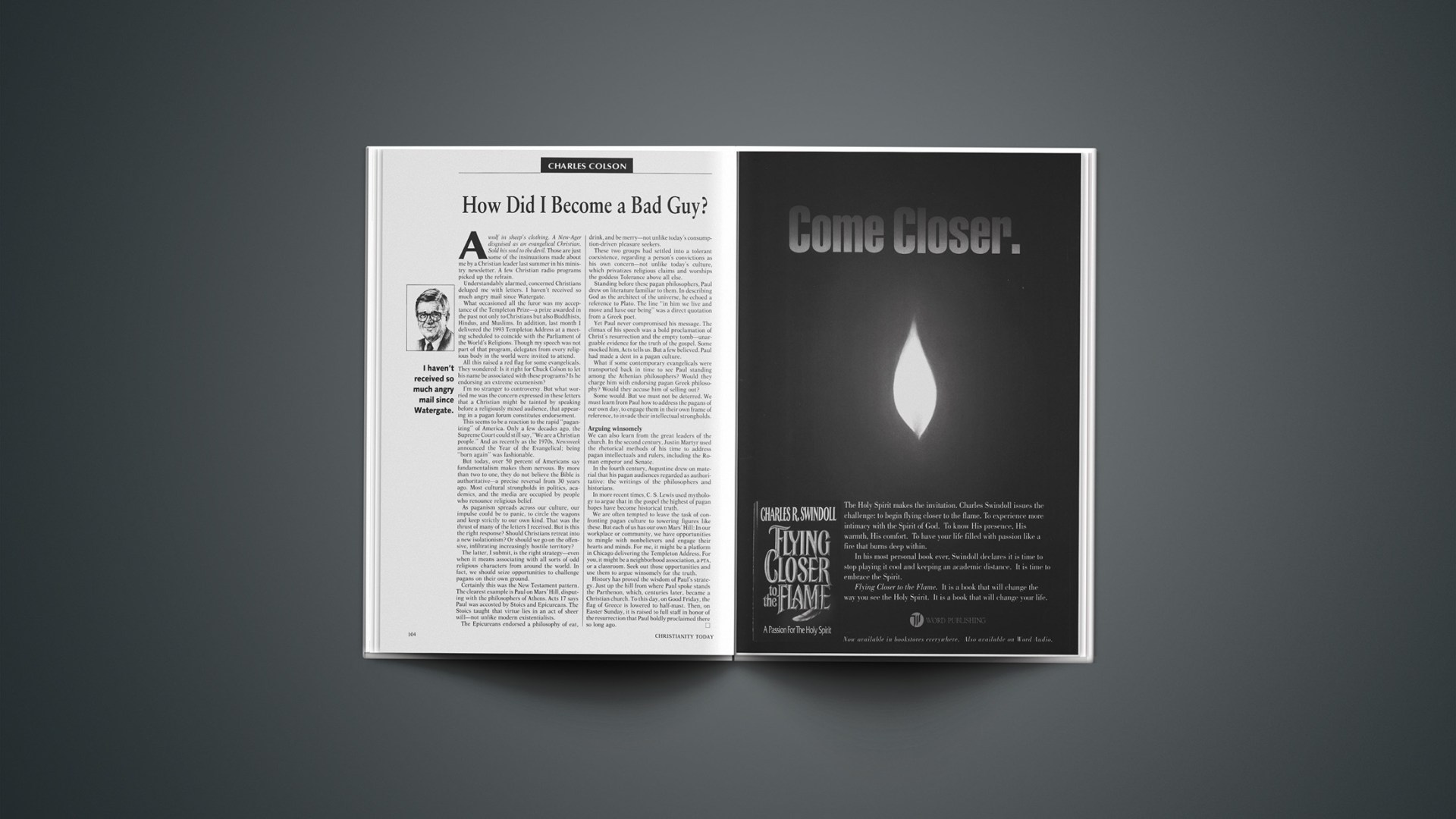Awolf in sheep’s clothing. A New-Ager disguised as an evangelical Christian. Sold his soul to the devil. Those are just some of the insinuations made about me by a Christian leader last summer in his ministry newsletter. A few Christian radio programs picked up the refrain.
Understandably alarmed, concerned Christians deluged me with letters. I haven’t received so much angry mail since Watergate.
What occasioned all the furor was my acceptance of the Templeton Prize—a prize awarded in the past not only to Christians but also Buddhists, Hindus, and Muslims. In addition, last month I delivered the 1993 Templeton Address at a meeting scheduled to coincide with the Parliament of the World’s Religions. Though my speech was not part of that program, delegates from every religious body in the world were invited to attend.
All this raised a red flag for some evangelicals. They wondered: Is it right for Chuck Colson to let his name be associated with these programs? Is he endorsing an extreme ecumenism?
I’m no stranger to controversy. But what worried me was the concern expressed in these letters that a Christian might be tainted by speaking before a religiously mixed audience, that appearing in a pagan forum constitutes endorsement.
This seems to be a reaction to the rapid “paganizing” of America. Only a few decades ago, the Supreme Court could still say, “We are a Christian people.” And as recently as the 1970s, Newsweek announced the Year of the Evangelical; being “born again” was fashionable.
But today, over 50 percent of Americans say fundamentalism makes them nervous. By more than two to one, they do not believe the Bible is authoritative—a precise reversal from 30 years ago. Most cultural strongholds in politics, academics, and the media are occupied by people who renounce religious belief.
As paganism spreads across our culture, our impulse could be to panic, to circle the wagons and keep strictly to our own kind. That was the thrust of many of the letters I received. But is this the right response? Should Christians retreat into a new isolationism? Or should we go on the offensive, infiltrating increasingly hostile territory?
The latter, I submit, is the right strategy—even when it means associating with all sorts of odd religious characters from around the world. In fact, we should seize opportunities to challenge pagans on their own ground.
Certainly this was the New Testament pattern. The clearest example is Paul on Mars’ Hill, disputing with the philosophers of Athens. Acts 17 says Paul was accosted by Stoics and Epicureans. The Stoics taught that virtue lies in an act of sheer will—not unlike modern existentialists.
The Epicureans endorsed a philosophy of eat, drink, and be merry—not unlike today’s consumption-driven pleasure seekers.
These two groups had settled into a tolerant coexistence, regarding a person’s convictions as his own concern—not unlike today’s culture, which privatizes religious claims and worships the goddess Tolerance above all else.
Standing before these pagan philosophers, Paul drew on literature familiar to them. In describing God as the architect of the universe, he echoed a reference to Plato. The line “in him we live and move and have our being” was a direct quotation from a Greek poet.
Yet Paul never compromised his message. The climax of his speech was a bold proclamation of Christ’s resurrection and the empty tomb—unarguable evidence for the truth of the gospel. Some mocked him, Acts tells us. But a few believed. Paul had made a dent in a pagan culture.
What if some contemporary evangelicals were transported back in time to see Paul standing among the Athenian philosophers? Would they charge him with endorsing pagan Greek philosophy? Would they accuse him of selling out?
Some would. But we must not be deterred. We must learn from Paul how to address the pagans of our own day, to engage them in their own frame of reference, to invade their intellectual strongholds.
Arguing winsomely
We can also learn from the great leaders of the church. In the second century, Justin Martyr used the rhetorical methods of his time to address pagan intellectuals and rulers, including the Roman emperor and Senate.
In the fourth century, Augustine drew on material that his pagan audiences regarded as authoritative: the writings of the philosophers and historians.
In more recent times, C. S. Lewis used mythology to argue that in the gospel the highest of pagan hopes have become historical truth.
We are often tempted to leave the task of confronting pagan culture to towering figures like these. But each of us has our own Mars’ Hill: In our workplace or community, we have opportunities to mingle with nonbelievers and engage their hearts and minds. For me, it might be a platform in Chicago delivering the Templeton Address. For you, it might be a neighborhood association, a PTA, or a classroom. Seek out those opportunities and use them to argue winsomely for the truth.
History has proved the wisdom of Paul’s strategy. Just up the hill from where Paul spoke stands the Parthenon, which, centuries later, became a Christian church. To this day, on Good Friday, the flag of Greece is lowered to half-mast. Then, on Easter Sunday, it is raised to full staff in honor of the resurrection that Paul boldly proclaimed there so long ago.
Loren Wilkinson is the writer/editor of Earthkeeping in the ’90s (Eerdmans) and the coauthor, with his wife, Mary Ruth Wilkinson, of Caring for Creation in Your Own Backyard (Servant). He teaches at Regent College in Vancouver, British Columbia, Canada.










